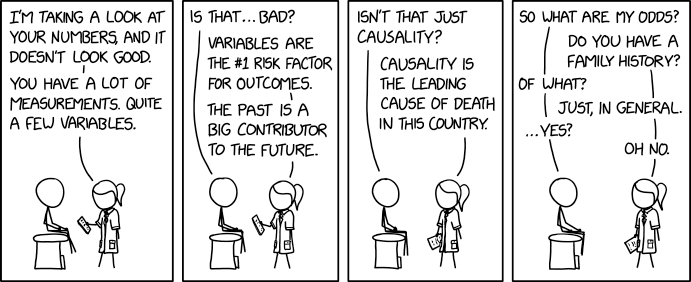Health Data

Donate now to help us find a cure for causality. No one should have to suffer through events because of other events.

Donate now to help us find a cure for causality. No one should have to suffer through events because of other events.
Cueball is at Doctor Ponytail's office receiving examination or test results, but her statements are frustratingly generic, and entirely useless. She says that his "numbers" have revealed many "measurements" and "variables" but doesn't specify what they, or their values, are. The number of measurements observed is simply a product of how many have been taken, and not of Cueball's specific condition. In response to being asked whether that is bad, she ominously says that variables are the number one risk of "outcomes." This is unhelpful, since every outcome is the product of some set of variables. Additionally, outcomes can be good, bad, or neutral, so it does not address the question. Doctor Ponytail further states that the past is "a big contributor to" the future, a similarly uninformative statement, as Cueball implies by asking whether that is just causality. The doctor replies that causality is the leading cause of death, which is so tautological as to be meaningless.
Cueball tries to cut to the root of the issue by asking his chances of survival. Ponytail asks whether Cueball has a family history, but rather than asking for a history of specific illnesses, she is merely asking whether he has any family history at all. Her apparent concern on discovering that he does is presumably due to the fact that everyone who has a family history dies, and therefore she sees this as negative. However, this is not medically informative, since everyone has some kind of family history (whether they personally know anything of it or not) and everyone eventually dies (as according to the article death).
The comic is likely a comment on the impenetrability of some medical diagnoses, where high levels of jargon and non-contextualized statistics, combined with a lot of hedging language, can leave patients none the wiser about their prospects or the relative merits of various courses of treatment. Similarly, it could be reflecting on the effects of availability bias and the base rate fallacy when medical practitioners are deriving diagnoses, treatment options, and similar conclusions from medical records designed to highlight the information necessary to diagnose specific well-understood illnesses. It may also be making fun of poorly defined health statistics: statistics for the leading causes of accidental death in the United States, for example, typically cite 'poisoning' as the number one cause, even though poisoning other than drug overdoses is actually quite rare. The comic takes vague statistics to the extreme, citing 'causality' as the leading cause of death. An alternate explanation is the comic is pointing out that the sicker a person is, the more tests are run. Ergo, a model for predicting death is the number of tests or measurements.
The title text continues the joke, suggesting that researchers are searching for a cure for causality, which is absurd and inconceivable.[citation needed]
The comic as a whole is reminiscent of 830: Genetic Analysis and 1840: Genetic Testing Results (particularly the title text of the latter), as the information given by the doctor in all three is self-evident and useless as a result.